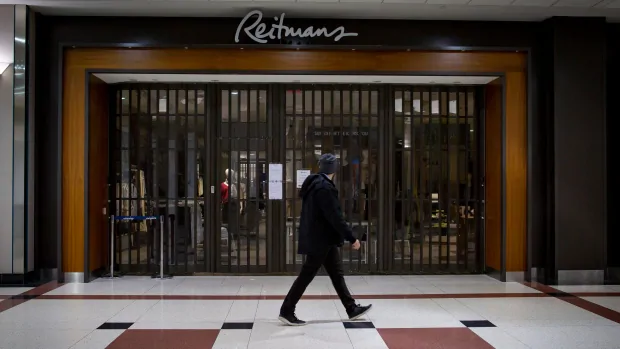The Canada Emergency Commercial Rent Assistance program — the federal program designed to ease the pressure on pandemic-damaged businesses by covering a portion of their rent — expires at midnight tonight, leaving many Canadian businesses in the dark about what Ottawa has planned to replace it.
CECRA covered up to six months of rent by extending forgivable loans for up to half the value of the monthly rent, in exchange for the landlord cutting rent.
Tenants participating in the program would still have to chip in 25 per cent of their pre-pandemic rent, while their landlords were expected to accept a 25 per cent loss on total rent paid. The scheme had its critics from the start — with the main complaint from business being that entry depended on buy-in from the landlord, who was under no obligation to participate.
But the scheme was still a lifeline meant to allow tenants to stay solvent and to help landlords keep their properties from falling vacant.
But now, as September draws to a close, the program is coming to an end with no replacement on the horizon. That worries landlords and tenants alike.
“When the government announced on September 8 that they were extending the program for September, they made it clear that it would not be renewed at the end of the month, but they also said there would be something to replace it,” said Perrin Beatty, CEO of the Canadian Chamber of Commerce.
“So at this point, small businesses across the country are desperate.”
‘Badly flawed’
It’s not that Beatty was wild about the program, which has been one of the most criticized and under-utilized of the federal government’s COVID-19 relief programs.
The Parliamentary Budget Officer has estimated that it used only about a third of its budget.
“The program itself was badly flawed,” Beatty said, “but it was better than nothing. What we have today is nothing.”
The Chamber of Commerce says it wants any replacement program to send relief directly to tenants, rather than landlords.
Sources at the Prime Minister’s Office, speaking on background, suggested that any new program would continue to deal directly with landlords.
Conservative Party Leader Erin O’Toole called for CECRA payments to go straight to tenants when he spoke with Prime Minister Justin Trudeau before the throne speech.
“The rent program ends now, having done nothing for 90 per cent of the small businesses in our country,” Conservative finance critic Pierre Polievre said yesterday.
Evictions to resume
The Canadian Federation of Independent Business (CFIB) has been lobbying the government to move faster to replace the program, saying about one in seven of its members is now staring bankruptcy in the face.
“There is no rent relief as of now that takes us forward through the fall,” CFIB’s vice-president Laura Jones told CBC News.
“There are two key bills that businesses have to pay. One is wages and the second is rent. And we know from our survey results that for many of our businesses, getting rent relief would significantly increase their odds of staying open.”
Jones said the problem is compounded by the fact that some provincial prohibitions on evictions are expiring at the same time as CECRA — meaning that tenants can now be forced out of their premises if they can’t pay.
Jones said the hardest-hit businesses should continue to receive rent support “at least through the fall and likely longer.
“And we’re suggesting that it include a top-up for other businesses that haven’t had access to rent relief, because for some businesses, they’re six months into the pandemic and they haven’t had any rent relief because their landlords never participated.”
Landlords also unhappy
But some of the landlords who did participate willingly in the CECRA program say it left them feeling burned.
Pamela Feifer said she would like it to be known that commercial landlords are not all large, faceless institutions with bottomless pockets. Some are family-owned holding companies like hers in Montreal, which has been in business for the past 50 years.
“We’ve had tenants for 25 to 40 years who are like part of our family,” she said. “A lot of our tenants are not triple-A tenants. They’re mom-and-pop shops whose survival revolves around this store or restaurant.”
Feifer said her company is also a small business “and we’re just trying to survive like everybody else.”
She said her company was quick to take advantage of CECRA and immediately cut rent by 75 per cent for all of its tenants. But the experience has left her feeling short-changed.
“We were happy to hear that the Quebec government had promised another 12.5 per cent for landlords in Quebec, and specifically Montreal, who were hit harder than the rest of Canada. And since then, it’s been only wishy-washy information. We haven’t received anything binding showing that we’re going to be getting this money,” she said.
“They keep saying, ‘It’s gonna come, it’s gonna come’ … It’s already going to be October 1 and we haven’t seen a penny of that 12.5 per cent.”
And while her tenants got a break on rent, she has had no such luck with her own taxes.
“Right now our taxes are crazy, more than we could get for the rent. We have several properties on Ste-Catherine, which has the highest taxes in Canada,” she said.
“All I know is we’ve paid our taxes fully for the year 2020 and we haven’t gotten any relief.”
‘Crazy-making’ rules
Feifer said she is concerned about calls to direct the new commercial rent benefit to tenants alone, without an enforceable requirement that they use the money to pay rent.
“I’m happy that the tenant would be helped, but would that money go directly to the landlord? Or would it go to their hydro bills? I have no clue,” she said.
“Not everybody could go on CECRA. I would say only about 70 per cent of our tenants could go on CECRA because they had to have lost 70 per cent of revenues from April, May and June.
“We were willing to have everyone go on it, but not everyone could. I have some restaurants that weren’t at a 70 per cent (drop in revenue), but rather at 60 per cent or 50 per cent, and they weren’t allowed to do any program.”
Laura Jones of CFIB said she is also hoping to see the 70 per cent rule relaxed in any CECRA replacement but added it’s even more important to change the program so that tenants can access it without needing to get their landlords involved.
“It’s been crazy-making for those business owners who really need the help and they qualify in every way, but their landlord wasn’t willing or able to participate,” said Jones. “And we did hear about some larger landlords where it was hard even to get ahold of someone to ask them a question about whether they would participate.”

Devoted web advocate. Bacon scholar. Internet lover. Passionate twitteraholic. Unable to type with boxing gloves on. Lifelong beer fanatic.




